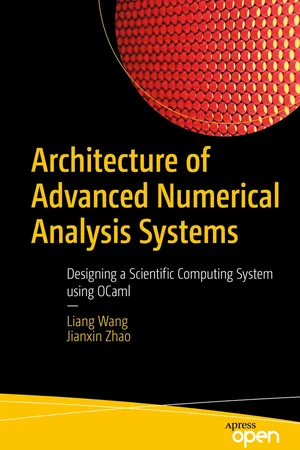
Architecture of Advanced Numerical Analysis Systems
Designing a Scientific Computing System using OCaml
- English
- ePUB (mobile friendly)
- Available on iOS & Android
Architecture of Advanced Numerical Analysis Systems
Designing a Scientific Computing System using OCaml
About this book
This unique open access book applies the functional OCaml programming language to numerical or computational weighted data science, engineering, and scientific applications. This book is based on the authors' first-hand experience building and maintaining Owl, an OCaml-based numerical computing library.
You'll first learn the various components in a modern numerical computation library. Then, you will learn how these components are designed and built up and how to optimize their performance. After reading and using this book, you'll have the knowledge required to design and build real-world complex systems that effectively leverage the advantages of the OCaml functional programming language.
What You Will Learn
- Optimize core operations based on N-dimensional arrays
- Design and implement an industry-level algorithmic differentiation module
- Implement mathematical optimization, regression, and deep neural network functionalities based on algorithmic differentiation
- Design and optimize a computation graph module, and understand the benefits it brings to the numerical computing library
- Accommodate the growing number of hardware accelerators (e.g. GPU, TPU) and execution backends (e.g. web browser, unikernel) of numerical computation
- Use the Zoo system for efficient scripting, code sharing, service deployment, and composition
- Design and implement a distributed computing engine to work with a numerical computing library, providing convenient APIs and high performance
Who This Book Is For
Those with prior programming experience, especially with the OCaml programming language, or with scientific computing experience who may be new to OCaml. Most importantly, it is for those who are eager to understand not only how to use something, but also how it is built up.
Tools to learn more effectively

Saving Books

Keyword Search

Annotating Text

Listen to it instead
Information
Table of contents
- Cover
- Front Matter
- 1. Introduction
- 2. Core Optimizations
- 3. Algorithmic Differentiation
- 4. Mathematical Optimization
- 5. Deep Neural Networks
- 6. Computation Graph
- 7. Performance Accelerators
- 8. Compiler Backends
- 9. Composition and Deployment
- 10. Distributed Computing
- 11. Testing Framework
- Back Matter
Frequently asked questions
- Essential is ideal for learners and professionals who enjoy exploring a wide range of subjects. Access the Essential Library with 800,000+ trusted titles and best-sellers across business, personal growth, and the humanities. Includes unlimited reading time and Standard Read Aloud voice.
- Complete: Perfect for advanced learners and researchers needing full, unrestricted access. Unlock 1.4M+ books across hundreds of subjects, including academic and specialized titles. The Complete Plan also includes advanced features like Premium Read Aloud and Research Assistant.
Please note we cannot support devices running on iOS 13 and Android 7 or earlier. Learn more about using the app